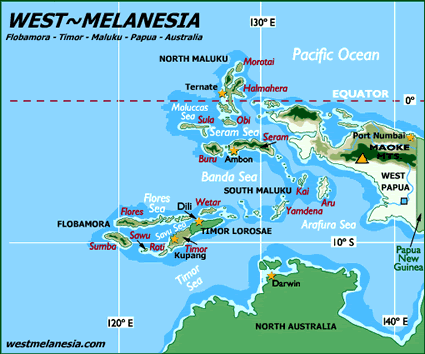The Teor people are the inhabitants of Teor Island (also spelled Tior or Téhor) in Maluku Province, and their identity is closely tied to this small, coastal island north of the Kei archipelago.
Their language is a Central–Eastern Malayo-Polynesian Austronesian variety often grouped with Kur as "Teor–Kur" (with distinct local speech on Teor itself), and linguistic surveys show the language has historically had a small speaker base and close links to neighboring island varieties.
Historically, the islanders have lived in a seafaring, fishing, and coastal-garden environment typical of the southern Maluku maritime world, and contact with traders, colonial authorities, and migrants has influenced their language and culture over time.
Life for the Teor people revolves around coastal village life, where families combine fishing, small-scale gardening, and participation in inter-island trade or labor to sustain their households.
Because Teor is a small island with limited services, many residents travel or migrate seasonally to larger islands for schooling, work, or trade, and younger generations increasingly use regional Malay varieties and Indonesian for education and commerce.
Local social life remains organized around village networks, kinship ties, and customary practices that reflect the archipelagic setting of southern Maluku.
The Teor community practices the major religions common in the southern Maluku islands, and many islanders identify with either Islam or Christianity while local customary beliefs and adat (customary law and ritual) continue to shape social life.
Religious life on small Malukan islands like Teor is often expressed through communal worship, inter-communal rituals, and local forms of devotion that are adapted to village life and to the coexistence of different faiths in the region.
Preservation and documentation of the Teor language and oral traditions would help sustain the community's cultural identity as outside languages and modern schooling become more dominant.
Economic opportunities that match island realities—such as sustainable fisheries, small-scale aquaculture, boat/transport services, and value-added processing of local products—would strengthen livelihoods without forcing cultural loss.
Improved access to culturally appropriate education and health services on the island or through supported travel options would reduce the need for disruptive out-migration and help the next generation remain connected to their home community.
Clear recognition of customary land and sea rights and local participation in any external development decisions would protect traditional resource use and village autonomy.
Pray for their spiritual needs to be met in Christ.
Pray for dreams and visions of the Risen Christ for Teor family leaders.
Pray for wise and sustainable stewardship of Teor's coastal and marine resources so that families may continue to live from the sea with dignity.
Pray for practical education and health solutions that allow children to learn and thrive without forcing families into permanent migration.
Pray for just recognition of customary land and fishing rights and for wise local leadership in conversations with outside developers or authorities.
Scripture Prayers for the Teor in Indonesia.
Teor (island). Wikipedia.
"Teor-Kur language." Wikipedia / linguistic summaries.
J. Hughes, "The Languages of Kei, Tanimbar and Aru." NUSA (paper discussing Teor–Kur distribution).
sealang.net
"Kur & Kaimer / Watubela region notes" (East Indonesia regional profile describing shared language and Islamic presence).
east-indonesia.info
"Seram Island." Wikipedia (context for religion and regional dynamics in Maluku).
Glottolog entry for Teor (language classification and references).
glottolog.org
| Profile Source: Joshua Project |











